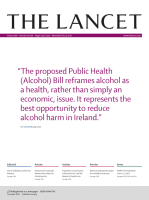 The Lancet has retracted a journalist-written piece about a controversial drug used off-label to induce abortions, and replaced it with a corrected version.
The Lancet has retracted a journalist-written piece about a controversial drug used off-label to induce abortions, and replaced it with a corrected version.
In the retraction notice, the journal said it “removed the information that we believe to be inaccurate.”
The article, first published Oct. 28, 2017, highlights Pfizer’s decision to withdraw the drug, misoprostol, from the French market in 2018, and explores the ongoing debate surrounding its uses and safety. Approved to treat ulcers, misoprostol is more often used off-label to induce labor or medical abortions, despite reports of serious side effects, including hemorrhaging and birth defects “sometimes associated with fetal death.”
In the past few years, a few journals, including The Lancet, have begun using retract and replace to correct research papers with honest but pervasive errors. Given that news outlets typically correct reported pieces when they contain errors, we asked The Lancet why it retracted and replaced the article, and what was wrong with the original, but have not yet heard back. We also reached out to the author, Barbara Casassus, who declined to comment.
Here’s the retraction and republication notice, published November 16 along with the corrected version, for “Misoprostol drug to be withdrawn from French market:”
On Oct 28, 2017, The Lancet published the World Report “Misoprostol drug to be withdrawn from French market” as an epage. After further information was provided to us, The Lancet Editors have decided to retract this World Report, and republish it having removed the information that we believe to be inaccurate. The old version of the World Report will be added to a webappendix attached to the new version and will be marked as retracted. Additionally, the following sentence should have read: “One issue is that the 200 μg Cytotec tablets have to be split into eight identical sections to obtain the 25 μg dose for labour induction, which means ‘there is a risk of overdose’, says Martin”.
In the sentence flagged by the notice, the new version replaced “abortion” with “labour induction.”
Another difference between the two versions appears in the following paragraph, which discusses a formulation of misoprostol called Angusta. The corrected article no longer contains the section in bold (for a comparison, see the original and corrected versions):
The ANSM [the French National Agency for Medicines and Health Products Safety] aims to ensure there are sufficient stocks of alternatives to replace Cytotec when it is no longer available, and to introduce a 25 μg-dosed misoprostol drug for inducing labour called Angusta in 2018, Martin says. Manufactured by Danish pharmaceutical firm Azanta, Angusta was launched in the five Nordic countries—Denmark, Finland, Iceland, Norway, and Sweden—in April, 2017. But “this is not a solution”, says Anne Loirette, vice president of the association Timéo et les Autres, which was founded by Joux. “The molecule is exactly the same as Cytotec. In Denmark, there are cases of women being sent home after taking the drug, and suffering such severe contractions that their uterus is ruptured before they can reach hospital”, she adds.
In March 2017, Azanta received approval in the five Nordic countries to market Angusta for labor induction. According to the company’s data, the list of safety concerns include uterine hyperstimulation and rupture.
Like Retraction Watch? Consider making a tax-deductible contribution to support our growth. You can also follow us on Twitter, like us on Facebook, add us to your RSS reader, sign up on our homepage for an email every time there’s a new post, or subscribe to our daily digest. Click here to review our Comments Policy. For a sneak peek at what we’re working on, click here. If you have comments or feedback, you can reach us at [email protected].
Another angle of the abortionforbidders – if the governments of the Scandinavian states think misoprostol is safe enough (and it seems that the gov of France does, too, as it was not the initiator of this retraction) why can an incorporation deprive us of our choices???
unfortunately, any claims about potential harm caused by this drug cannot be trusted due to the agenda of those making them.